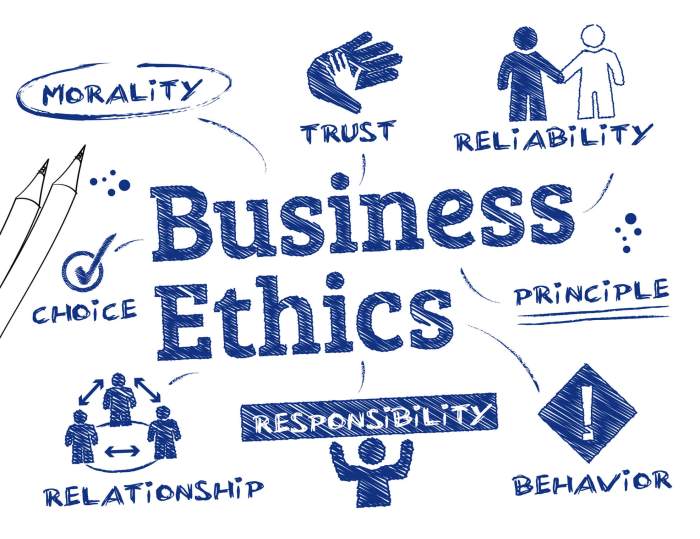Business ethics sets the tone for ethical decision-making, corporate social responsibility, and ethical leadership within organizations, paving the way for long-term success and positive impact.
Exploring the intricacies of ethical practices and their impact on business operations unveils a world where integrity and values play a pivotal role in shaping a company’s reputation and brand value.
Importance of Business Ethics

In the world of business, ethics play a crucial role in determining the long-term success of a company. Upholding strong ethical standards can lead to sustainable growth, positive relationships with stakeholders, and a reputable brand image. On the other hand, failing to prioritize ethics can result in severe consequences that may damage a company’s reputation and bottom line.
Examples of Companies with Ethical Violations, Business ethics
- Enron: The energy company’s scandal in the early 2000s involved accounting fraud and unethical practices, leading to bankruptcy and job losses for thousands of employees.
- Volkswagen: The auto manufacturer was caught cheating on emissions tests, causing a major blow to its credibility and financial standing.
- Wells Fargo: The banking giant faced backlash for opening unauthorized accounts for customers, resulting in fines and a tarnished reputation.
Benefits of Ethical Practices
- Enhanced Reputation: Companies that prioritize ethics build trust with customers, employees, and investors, ultimately strengthening their brand reputation.
- Increased Brand Value: Ethical behavior can differentiate a company from its competitors and attract socially conscious consumers who value integrity.
- Positive Work Culture: Ethical practices create a positive work environment, fostering employee loyalty, productivity, and overall job satisfaction.
Ethical Decision-Making

In a business context, ethical decision-making involves evaluating and choosing between options that align with moral principles and values. It requires considering the impact of decisions on various stakeholders, such as employees, customers, suppliers, and the community.
Strategies for Ethical Decision-Making
- Consult company policies and codes of conduct to guide decision-making processes.
- Seek advice from supervisors, mentors, or ethics committees when faced with moral dilemmas.
- Consider the long-term consequences of decisions on all stakeholders, not just short-term gains.
- Reflect on personal values and beliefs to ensure alignment with ethical standards.
- Act with transparency and integrity, even when facing difficult choices.
Ethical Decision-Making for Sustainable Business Practices
Ethical decision-making can lead to sustainable business practices by promoting trust and credibility among stakeholders. When businesses prioritize ethics, they are more likely to build long-lasting relationships with customers and suppliers. Additionally, ethical practices can enhance reputation, attract top talent, and create a positive work culture. By making decisions based on ethical considerations, businesses can contribute to a more sustainable and socially responsible future.
Corporate Social Responsibility (CSR)
Corporate Social Responsibility (CSR) refers to a company’s commitment to operating in an ethical and sustainable manner, taking into consideration the impact of its actions on society and the environment. It involves going beyond legal requirements and actively contributing to the well-being of stakeholders, including employees, customers, communities, and the environment.
Connection between CSR and Business Ethics
CSR is closely connected to business ethics as it involves making ethical decisions that benefit not only the company but also society as a whole. By integrating ethical practices into their operations, companies can build trust with stakeholders, enhance their reputation, and create long-term value for both the business and the community.
Benefits of CSR Initiatives
- Enhanced Reputation: Companies that engage in CSR initiatives are viewed more favorably by consumers, leading to increased brand loyalty and positive word-of-mouth.
- Increased Employee Engagement: CSR programs can boost employee morale and motivation, leading to higher retention rates and productivity.
- Cost Savings: Implementing sustainable practices can reduce waste, energy consumption, and operational costs in the long run.
- Improved Stakeholder Relationships: By addressing social and environmental issues, companies can build stronger relationships with stakeholders, including investors and regulatory bodies.
Examples of Successful CSR Programs
- Patagonia: The outdoor apparel company is known for its commitment to environmental sustainability, including using recycled materials in its products and supporting environmental causes.
- TOMS Shoes: For every pair of shoes sold, TOMS donates a pair to a child in need, showcasing their dedication to social impact and giving back to communities.
- Microsoft: Through its AI for Good program, Microsoft uses artificial intelligence to address social and environmental challenges, such as healthcare disparities and climate change.
Ethical Leadership: Business Ethics
Ethical leadership plays a crucial role in promoting a culture of integrity within an organization. Leaders set the tone for ethical behavior and decision-making, influencing the entire workforce to follow suit.
Role of Ethical Leadership
- Lead by example: Ethical leaders demonstrate honesty, transparency, and fairness in their actions, inspiring others to do the same.
- Communicate values: Clearly articulate and reinforce the organization’s ethical values and expectations to create a shared understanding among employees.
- Hold others accountable: Ethical leaders ensure that unethical behavior is addressed promptly and consistently, sending a message that integrity is non-negotiable.
Tips for Developing Ethical Leadership Skills
- Continuous self-reflection: Regularly evaluate your own actions and decisions to ensure they align with ethical principles.
- Seek feedback: Be open to feedback from colleagues, mentors, and employees to gain different perspectives on your leadership style.
- Invest in ethical training: Take courses or workshops on ethical leadership to enhance your understanding and skills in this area.
- Mentor others: Serve as a role model for ethical behavior and mentor aspiring leaders to cultivate a culture of integrity within the organization.